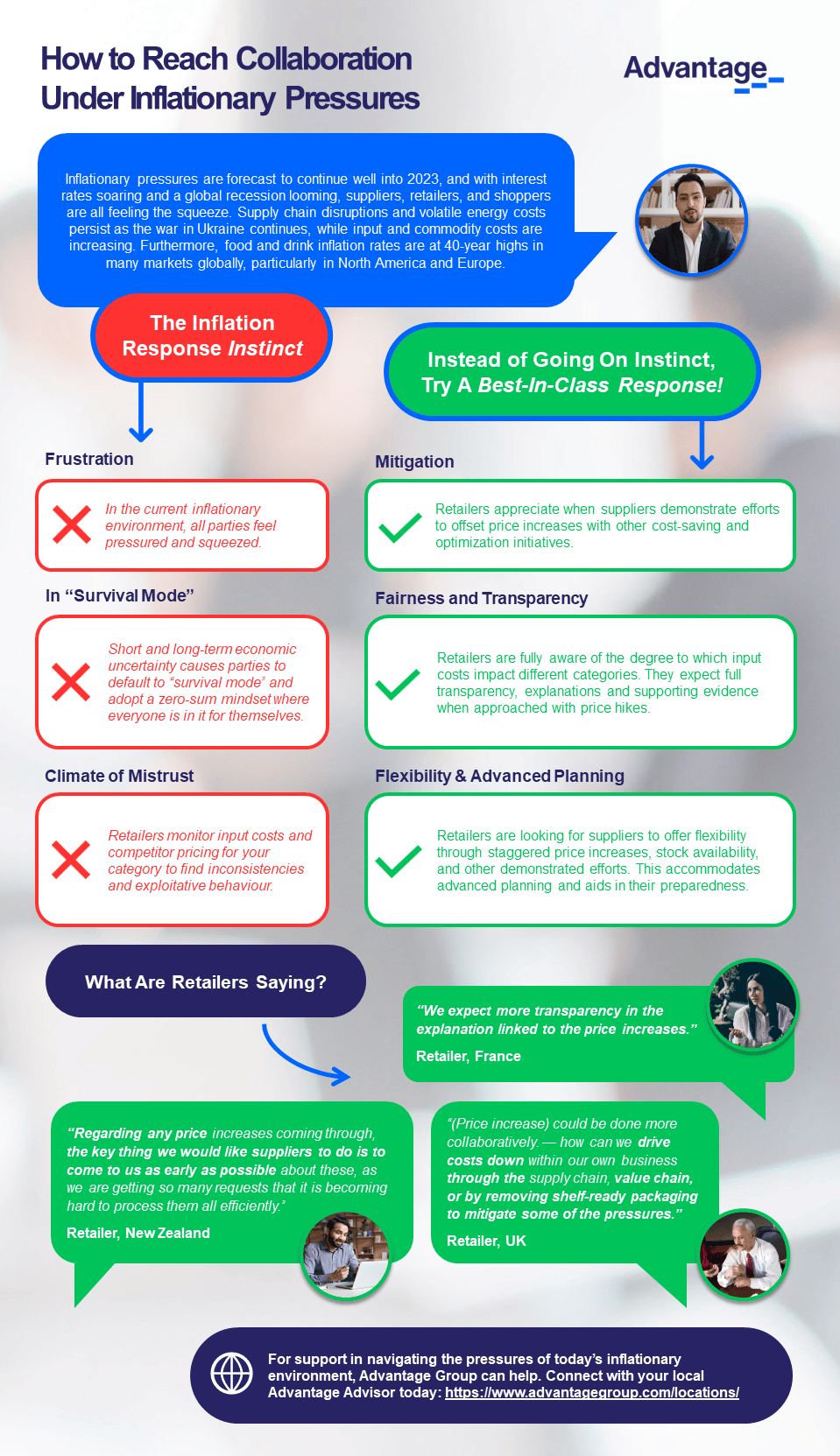Global inflationary pressures are forecast to continue well into 2023. Supply chain disruptions and volatile energy costs persist because of the ongoing war in Ukraine. This has caused input and commodity costs for businesses to rise consistently. With interest rates soaring and a global recession looming, suppliers, retailers, and shoppers find themselves economically strained.
Retailer-supplier partnerships struggle to exist in this challenging climate
When business partners have to deal with this confluence of pressures, the business environment can turn hostile as business partners react out of character and lean into unproductive instincts.
- Frustration levels rise because retailers and suppliers feel squeezed for margin, cornered and financially stressed by external factors out of their control. For retailers, there are few options. The most obvious choice would be to raise prices broadly; however, as McKinsey notes, this has the potential to hurt customers.
- Survival mode kicks in as short and long-term uncertainty prompts business partners to adopt a zero-sum negotiation approach.
- Mistrust grows as retailers scrutinize input costs and competitor pricing to find monitor for exploitative behaviour from suppliers.
Operating under such challenging conditions is demotivating, and it can be difficult for businesses to see a path forward. However, as with most challenges in the business environment, astute financial management coupled with a collaborative approach provides a mitigating solution to the damaging effects of soaring inflation.
While the pandemic spurred collaboration, increased empathy and made joint problem-solving necessary for mutual success, the pressurized high-inflation environment has now put this at risk. Retailers understand the need for suppliers to pass on price increases. However, suppliers must communicate with them effectively. How should suppliers approach these challenging and uncomfortable conversations? What strategies make a supplier best-in-class?

Three tactics suppliers should utilize to collaborate on price management
- Be open to mitigation
Retailers appreciate it when suppliers demonstrate efforts to offset price increases with other cost-saving and optimization initiatives. Price increases are inevitable; however, suppliers can hurt their relationships without communication and an attempt to reduce the impact these increases have on retailers.
For example, a cost-saving initiative such as funding a promotion can offset a retailer’s price increase. Financially, it’s effective, but its impact on the relationship is equally important. Seeking a win-win solution and moving away from the emotionless, zero-sum mindset demonstrates to your retailer that you are open to collaborative solutions, particularly with price management.
- Practice fairness and transparency
Retailers are fully aware of the degree to which input costs impact different categories. Be prepared to provide data and the corresponding impact resulting in retailer price increases to solidify your credibility with retailers. They expect full transparency, explanations and supporting evidence when approached with price hikes.
Retailers need the information to reduce their uncertainty and collaborate with you; this may be in the form of a supplier cost analysis and subsequent negotiation. By providing evidence and explanations, you give them room to negotiate and work with you to find a solution that provides mutual cost benefits. Without this, you risk losing a customer.
- Be flexible and plan in advance
Retailers are looking for suppliers to offer flexibility through staggered price increases, stock availability, and other demonstrated efforts. This accommodates advanced planning and aids in their preparedness.
Retailers also have their customer relationships to consider. Price increases can be dangerous for these relationships, forcing retailers to devise solutions for mitigating their impact. By being flexible in your approach, you, in turn, give retailers the flexibility to innovate and develop strategies for absorbing the price increase.
During such a difficult economic time, listening to and collaborating with your partner is more critical than ever. Advantage Report provides the feedback and data needed to connect with your business partners on opportunities for mutual success. Connect with an Engagement Advisor today to learn more.






